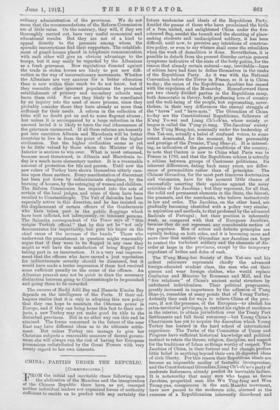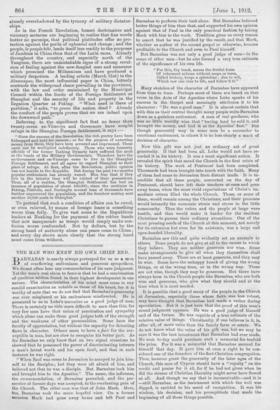F ROM the initial and inevitable chaos following upon the abdication
of the Manchus and the inauguration of the Chinese Republic there have, as yet, emerged neither individual leaders nor organized forces of authority sufficient to enable us to predict with any certainty the future tendencies and ideals of the Republican Party. Amidst the [means of those who have proclaimed the birth of a free, united, and enlightened China under the five. coloured flag, amidst the tumult and the shouting of place- seeking students and. undisciplined soldiery, it has been difficult, until now, to perceive any intentions of construc- tive policy, or even to say whence shall come the rebuilders whoa the work of demolition is done. Nevertheless, it is possible to detach from the present disorder certain general symptoms indicative of the state of the body politic, for the reason that already certain natural—nay, inevitable—lines of schism have had time to define themselves in the ranks of the Republican Party. As it was with the National Convention before the Terror in France, so it is in China to-day ; the union of the Republican Jacobins has ceased with the expulsion of the Monarchy. Henceforward there are two clearly divided parties in the Republican camp, both democratic in theory, both professing love of country and the well-being of the people, but representing, never- theless, in their very differences the eternal struggle of the " haves " and " have-nots." The Girondins of China to-day are the Constitutional Republicans, followers of K'ang Yu-wei and Liang Ch'i-ch'ao, whose society or league is called the T'ung-yi-tang. The Jacobins' society is the T'ung Meng-hui, nominally under the leadership of Sun Yat-sen, actually a babel of confused voices, to some extent dominated, for the moment, by the personality and prestige of the Premier, T'ang Shao-yi. It is interest- ing, as indicative of the general conditions of the country, to note that Canton is now to China what Paris was to France in 1789, and that the Republican schism is actually a schism between groups of Cantonese politicians. Its inherent differences, dating back many years, are differ- ences of personalities rather than of principles. The Chinese Girondins, for the most part timorous doctrinaires and visionaries, have for the moment little chance of successfully asserting their opinions against the noisy activities of the Jacobins • but they represent, for all that, the solid and permanent elements in the State, the literati, the peasants, and the merchants, who believe instinctively in law and order. The Jacobins, on the other band, are gradually becoming identified with a policy very similar, in aspiration and methods, to that professed by the advanced Radicals of Portugal ; but their position is inherently weak, as compared with that of European Jacobins, because they do not represent any considerable section of the populace. Men of action and definite principles are equally lacking on both sides, and it is becoming more and more clear that neither Girondins nor Jacobins can hope to control the turbulent soldiery and the elements of dis- order at large in the provinces, except by the temporary expedient of bribes and doles of cash.
The T'ung Meng-hui Society of Sun Yat-sen and his ardent reformers represents chiefly the advanced foreign-educated student class, tho mon who cut their queues and wear foreign clothes, who would replace Confucius and Mencius by Rousseau and Mill, and the " five relations " of China's ancient social structure by unfettered individualism. Their political programme, greatly increased in importance by the adhesion of T'ang Shao-yi, resembles at many points that of Young Turkey. Ardently they seek for ways to relieve China of the pres- sure, if not the presence, of the European—to abolish his extra-territorial privileges, to restrict his rights of residence in. the interior, to obtain jurisdiction over the Treaty Port Settlements and full fiscal autonomy—but Young China's Chauvinism has yet to acquire the discretion which Young Turkey has learned in the hard school of international experience. The Turks of the Committee of Union and Progress have sufficient historical knowledge and political instinct to retain the throne, religion, discipline, and respect for the traditions of Islam as things worthy of respect. 'rho Jacobins of China, in their furious zeal for change, profess little belief in anything beyond their own ill-digested ideas of civic liberty. For this reason their Republican ideals are become an impossible medley of fantastic incongruities, and the Constitutional Girondins,Liang Ch'i-ch'ao's party of moderate Reformers, already predict its inevitable failure. It is noteworthy that many men. who began as fierce Jacobins, propertied men like Wu Ting-fang and Wen Tsung-yao, conspicuous in the anti-Manchu movement, have now passed to the moderate side, alarmed at the excesses of a Republicanism inherently disordered and already overshadowed by the tyranny of military dictator- ships. As in the French Revolution, honest doctrinaires and visionary sectaries are beginning to realize that fine words butter no parsnips, that political platitudes offer no pro- tection against the perils of upheaval and change ; and the people, is peuple bete, lends itself less readily to the purposes of Jacobins in China than that of the Latin races. Already throughout the country, and especially north of the Yangtsze, there are unmistakable signs of a strong revul- sion of feeling against the uew-fangled men and measures which promised. the Millennium and have produced a military despotism. A leading article (March 31st) in the Siwwanpao, the most influential paper in China, bitterly contrasts the widespread chaos prevailing in the provinces, with the law and order maintained by the Municipal Council within the limits of the Foreign Settlement at Shanghai and the security of life and property in the Legation Quarter at Peking. " What need is there of partition," it asks, "to prove the nation dead ? Already the conduct of the people proves that we are indeed upon the downward path." Referring to the significant fact that no fewer than twenty-seven ex-Viceroys and Governors have sought refuge in the Shanghai Foreign Settlement, it says :- "Since the success of the Revolution, the rich gentry have been kidnapped and held for ransom ; or for the purpose of extorting money from them, they have been arrested and imprisoned. These eases can be multiplied indefinitely. Those who were formerly officials of the former 'aching Dynasty have suffered the most at the hands of the Military Governments. Therefore have the ex-Governors and ox-Viceroys come to live in the Shanghai Foreign Settlement, and all agree to regard Shanghai as their place of refuge. At first, after the Revolution, public opinion was not hostile to the Republic. But during the past two months popular enthusiasm has already waned. Men fear that if they live in the interior they will be robbed of their possessions. Thus, all of a sudden, the Shanghai Settlement has had an increase of population of about 100,000; since the mutinies in Peking, Tientsin, and Paotingfu several tens of thousands have further augmented the population, and the Soochow mutiny sent another 10,000 souls to Shanghai."
To pretend that such a condition of affairs can be cured, or even relieved, by means of foreign loans is something worse than folly. To give vast sums to the Republican leaders at Nanking for the payment of the robber bands that now masquerade as troops would simply make con- fusion worse confounded. Not by dollars, but by the strong hand of authority alone can peace come to China ; and every day shows more clearly that the strong hand must come from without.







































 Previous page
Previous page